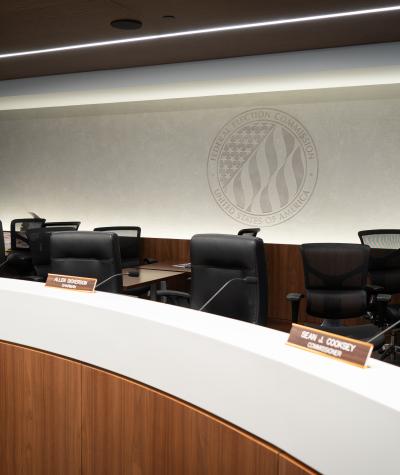One of the Federal Election Commission’s (FEC) core functions is ensuring that the money raised and spent on elections is transparent.
However, it has failed to carry out this mission with regard to national political parties, which — pursuant to legislative amendments passed in 2014 — can accept dramatically larger contributions to fund certain “special purposes”— like legal proceedings, paying for party headquarters expenses, and hosting presidential nominating conventions.
While these “special purpose” accounts have existed since 2014, the FEC has still not adopted any regulations instructing the party committees on how to report receipts and disbursements from them.
As a result, it is difficult, if not impossible, for voters to pinpoint who is donating to special-purpose accounts and how the parties are spending the money contributed to them — including to assess whether the parties’ disbursements comply with law.
That’s why Campaign Legal Center (CLC) and our partner OpenSecrets filed a rulemaking petition asking the FEC to create uniform reporting rules for national party committees’ special-purpose accounts.
CLC and OpenSecrets filed their petition in 2019, once it became clear the FEC was not going to act on its own. And by 2023, when the FEC still had not so much as created draft regulations, CLC and OpenSecrets sued, alleging that the FEC’s delay in taking up their petition was unreasonable.
In a win for transparency and accountability, a federal district court agreed with us and held that the FEC violated the Administrative Procedure Act by failing to take final action on our petition for over six years.
In a January 2026 decision, the court ordered the parties to develop a plan and deadline for FEC action, and the court stated that it would require regular progress reports from the FEC.
Now, it’s time for the FEC to follow the court’s direction and finally provide clarity on the reporting rules for national political party committees.
National Political Party Committees Should be Transparent
Real transparency about the ever-increasing amount of money spent to influence elections — including the large sums raised and spent by national political parties for things like conventions and party headquarters — leads to more accountability.
When voters know who is cutting big checks to help Democrats buy office space or fund a Republican convention, they have greater insight into who may be influencing that party’s agenda.
But since 2014, there has been a major block to voters’ ability to see how national party committees spend their money.
That year, Congress amended the Federal Election Campaign Act (FECA) to allow special-purpose accounts that can be used to manage party headquarters, organize presidential nominating conventions and fund legal proceedings. It also permitted those new accounts to accept funds up to three times higher than the general contribution limit for national party committees.
This means a great deal of money is flowing into these accounts. Each national political party currently operates up to seven of these special-purpose accounts. (A party’s congressional and senatorial committees can each have two accounts, and the national committee can have three.)
Currently, an individual can contribute up to $265,800 per account, or over $1.8 million total, to a single party over a two-year election cycle.
The problem for transparency — and by extension, democracy — is not necessarily the astronomical sums that these accounts can receive, but the FEC’s utter failure to implement critical regulatory changes to ensure that parties provide meaningful disclosure of the funds flowing into and out of their special-purpose accounts.
Known as the “Cromnibus” amendments, they were created by three paragraphs of a 700-page, must-pass government funding bill, which did not contain any specific reporting requirements for these accounts.
While every political committee — including those tied to national parties — must file periodic reports that detail the committee’s total receipts, disbursements and cash on hand, there is no FEC rule explaining how to report legally required details about the money flowing through these special-purpose accounts.
In the absence of clear guidance from the FEC, the parties are making up their own rules. As a result, anyone looking at a party committee’s reports to try to understand how it’s using its special-purpose accounts must comb through tens of thousands of pages and tally receipts and disbursements by hand.
This task is complicated by the fact that the party committees report inconsistently, using different terms and different reporting fields to document special-purpose account transactions.
Voters have a right to know how national political parties that control our government are raising and spending money as they seek to influence elections. That means being able to make a clear-eyed assessment of who is bankrolling their expenses and how much they are spending on items like lawsuits and upscale office furniture.
When national political party committees can collect huge amounts from wealthy donors — and there’s no meaningful way for the public to track where that money goes — that is a problem for democracy.
Holding the FEC Accountable
CLC and OpenSecrets’ lawsuit already prompted the FEC to create a sorting tool on its website to help voters view special-purpose account transactions. But it has continued to fail to act on our petition and issue clear rules.
Now, with the recent court order requiring the FEC to promptly consider our rulemaking petition, uniform reporting rules — that finally offer voters the transparency they are guaranteed under FECA — should be on the horizon.
CLC has been at the forefront of demanding solutions to FEC dysfunction for over a decade. Join us in this work, and read more about how we use the courts to respond to this and other forms of FEC inaction here.


